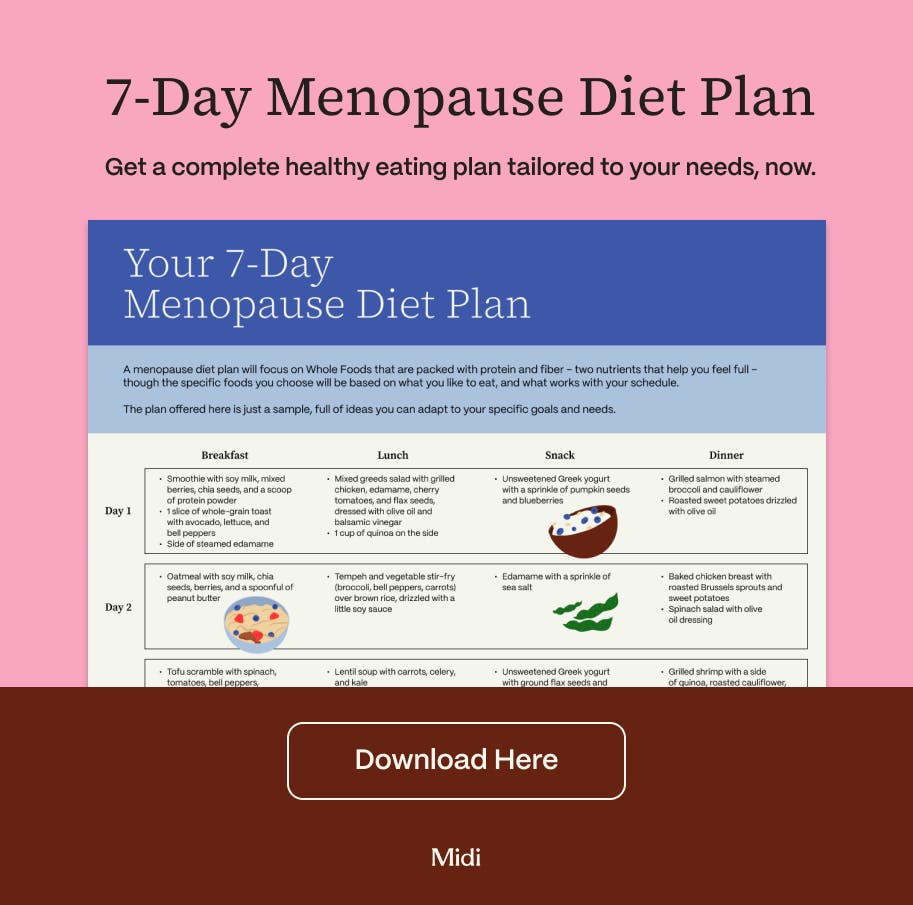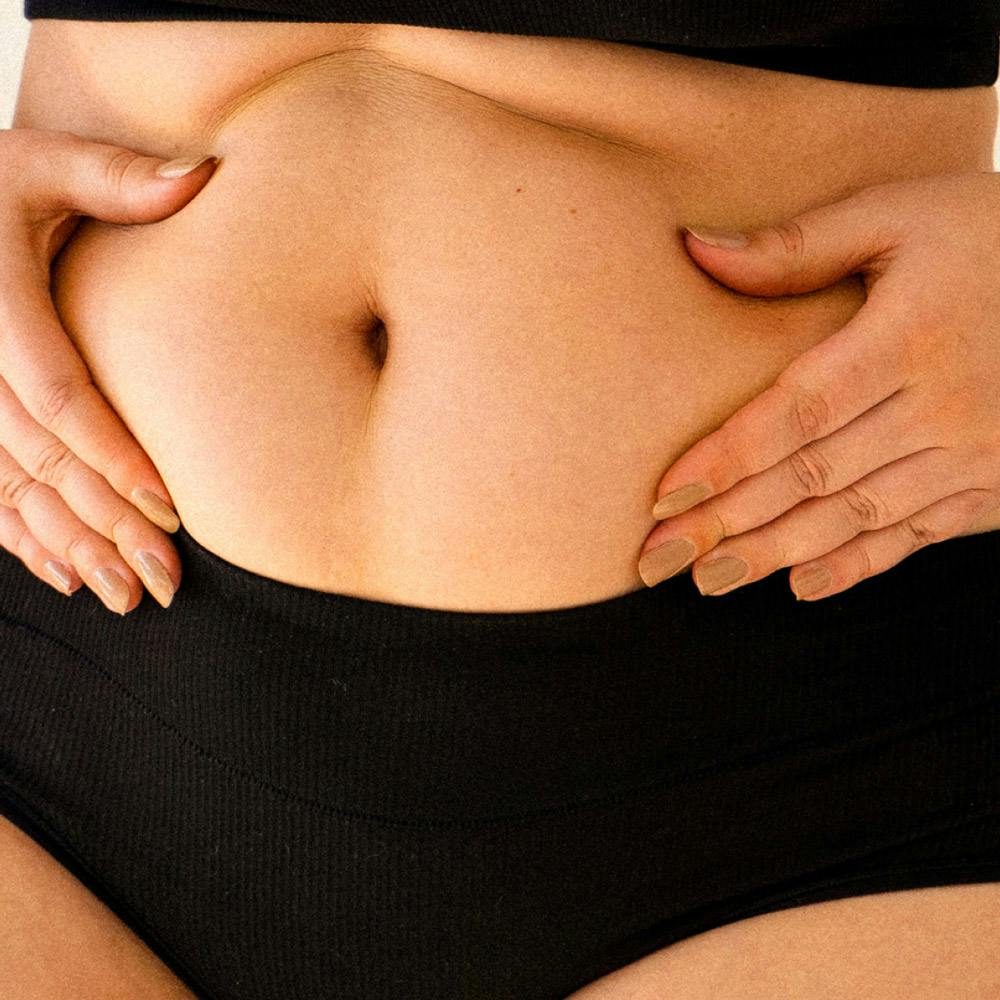A menopause diet isn't all that different from most healthy, balanced diets you'll hear about today—but it involves key food choices that can help manage menopause symptoms and maintain your health. The best foods for menopause include plenty of nutrient-dense options and avoid processed items, added sugars, and refined carbs. Together, these choices support hormone balance, bone health, and overall well-being during menopause.
During menopause and perimenopause, the time leading up to your periods fully stopping, your body can feel a bit out of control. Sleep is suddenly elusive, you have hot flashes out of nowhere, your mood and concentration feel “off”, and you may be gaining weight for obvious reasons. There are dozens more symptoms women experience that don’t seem connected to menopause, but are. What’s important to know is that you have more control than you think, and simple changes you can make start with what you eat every day.
Take what’s happening on the scale: While weight gain may be a common symptom of menopause–and one that affects 87% of Midi patients—it’s not inevitable.
Because of hormonal changes, natural shifts due related to aging, and lifestyle factors in midlife, many women experience “weight creep”—when we may gain small amounts of weight slowly over time. “In addition, you may also notice that your body shape is changing, with more fat accumulating in your midsection, which is what we call ‘central’ weight gain,’” says Midi’s Chief Medical Officer, Kathleen Jordan, MD. “Many of the hormone changes you experience as part of menopause are actually significant contributors to weight struggles. So focusing on nutrition becomes crucial during menopause to align with your body's changing energy needs, especially on a weight loss journey.”
So, if you're wondering how to lose weight during menopause, you've come to the right place. Diet is incredibly important during midlife both to manage weight, improve menopause symptoms, and lessen health risks like heart disease and type 2 diabetes. Fortunately, you don’t need to overhaul your diet all at once. You can start making tweaks to your diet that really move the needle on your health and help you feel great at the same time.
Understanding Menopause and Nutrition
Your body goes through some pretty dramatic changes in the years between 35 and 65. As your reproductive system is winding down during the menopausal transition, your hormones are shifting, bringing on symptoms that start with irregular periods, and may include mood problems, trouble sleeping, brain fog, fatigue, and many more. For many women, the symptom they notice (and obsess about) the most is weight gain.

The root cause of menopause symptoms is a reduction in estrogen, which negatively impacts our body’s metabolism. That’s a big reason women in midlife burn about 250 to 300 fewer calories per day. As estrogen decreases, you lose the hormone’s hunger-suppressing power, which may set the stage for overeating. As we age, our bodies also naturally tend to steadily lose muscle and accumulate fat, which can also downshift our metabolism.
Then, there are menopausal symptoms that make it more difficult to maintain healthy habits, such as insomnia and fatigue that sabotage exercise plans, increase hunger hormones, and push us toward sugary foods for a much-craved energy boost.
When weight becomes an issue, your health suffers: Past research shows that postmenopausal women are about five times more likely to develop abdominal obesity compared to premenopausal women, a change that increases the risk for high cholesterol, blood sugar, and blood pressure as well as heart attacks, diabetes, fatty liver disease, cancer, and more. (Whew!)
Now for some much better news. Despite the hormonal headwinds of midlife, you don’t have to simply accept weight and body changes. What’s been shown to make a difference is a healthy lifestyle, as well as medical support when appropriate. There are a full range of treatment options out there, and they all start with making dietary changes that support your body’s new nutritional and calorie needs during menopause. The best news of all? Many of the nutritional choices that help with menopausal weight gain improve other symptoms of hormonal transition, which in turn helps you maintain healthy habits and keep the scale stable. It’s a virtuous cycle that starts with what’s in your fridge and on your plate.
Key Components of a Healthy Menopause Diet
As we describe a healthy menopause diet, keep in mind that no matter what your eating habits currently look like, you can get closer to that healthy diet by making one small change, practicing it until it becomes a habit. Then you’re ready for another, and another…
Healthy balance of nutrients and foods
Although there are many fad diets out there, it should feel good to know that you don’t have to follow any of them. Because there’s no single “best” diet. There are a range of balanced eating patterns that are considered healthy for midlife. What’s most important is choosing one that you find enjoyable and that you can maintain over the long haul. For many women, that will be a diet that contains a balance of all three of the macronutrients: carbohydrates, protein, and fats. The key is to make nutrient-rich choices within each of these categories.
Avoid sugar, highly processed foods, and fast foods
A life devoid of your favorite treats and the occasional fast food run would be, honestly, sad. “You don’t want to constantly deprive yourself. Sometimes a scoop of ice cream can be exactly what you need after a hot flash,” says Dr. Jordan. “But foods with lower overall sugar and slower absorption make it easier to maintain healthy blood sugar and energy levels, avoiding cravings and fatigue. More importantly, you’ll protect against the cardiovascular and cellular damage that can come from high blood sugar levels.” Highly processed foods–sugary sodas, some frozen foods, fast foods, refined snacks, desserts–are typically high in sodium, sugar, saturated fats, and calories. These foods are calorie dense and all-too-easy to overeat. That not only prompts weight gain, but an overreliance on these in the diet also increases the odds of developing high cholesterol and blood pressure, risk factors for heart disease.
Drink plenty of water
Water not only makes up 60% of our bodies, but it’s especially important for women in midlife. Symptoms like hot flashes and night sweats can cause water loss, so staying hydrated is essential at this time. Adequate fluids also maintain metabolic function, keep your digestion running smoothly (bye-bye bloat), and help maintain healthy skin. When it comes to weight, water is a calorie- and sugar-free beverage, so it should be the foundation of what you drink during the day. Plus, there’s some evidence that drinking water before meals may increase satiety, leading to a small amount of weight loss.
Focus on foods that address menopause symptoms
The foods you choose can make it easier to manage menopause symptoms. For example, dropping estrogen makes women vulnerable to bone loss during the menopause transition. Low-fat dairy (think yogurt and cottage cheese) is packed with calcium and vitamin D that help fortify your bones against osteopenia and osteoporosis. Soy-containing foods like tofu and edamame provide plant estrogens that can turn down the heat on hot flashes. Eating ample protein–chicken, fish, tofu–can keep your hair healthy to decrease hair loss. And when it comes to digestive symptoms like bloating, adding ginger to your diet can help your belly deflate.

Managing Weight Gain During Menopause
Menopause is associated with three main body and weight changes:
- An increase in the risk of obesity.
- Change in body shape, with more fat accumulation around the waist (visceral fat).
- Change from a “pear” body shape to more of an “apple.”
As we mentioned earlier, weight gain doesn’t typically come on all at once. It’s more like a slow increase–sometimes barely noticeable–that sticks around. On average, women gain about 1.5 pounds per year during midlife.
What Success Looks and Feels Like
Food choices aren’t the only factor at play, but you do want to try your best to make good ones—not just for weight but for strength, energy, and overall health. Focusing on nutrient-dense foods that support your body’s changing needs and your new hormonal normal during this time will help you feel your best.
When it comes to exercise, the recommendations are 150 minutes of moderate-intensity exercise per week. That includes walking, jogging, cycling, swimming, playing soccer in the backyard with your kids, hiking, gardening, or any number of heart-rate boosting activities that you enjoy. Adding in at least two sessions of full-body muscle-building activity, such as lifting weights will help your body hold onto muscle (and build more!) to keep your metabolism up and muscles and bones strong.
Foods that Support Hormone Balance
A hormone-balancing diet doesn’t leave anything out–you don’t have to worry about feeling deprived. The following foods not only support reproductive hormones like estrogen, but they also help your body maintain healthy levels of thyroid hormones, insulin (for blood sugar balance), cortisol (your stress hormone), hunger and appetite hormones, and more:
- Whole soy foods like tofu, edamame, soy milk, and tempeh
- Protein-rich foods, such as poultry and fish
- Beans and lentils
- Whole grains
- Fruits like berries
- Vegetables like dark leafy greens and cruciferous veggies (broccoli, Brussels sprouts, cauliflower)
- Seeds like flax seeds, chia, pumpkin and more
- Low-fat and nonfat dairy
- Healthy sources of fat like olive oil, fatty fish, avocados
In addition, you’ll want to eat foods that are high in calcium and vitamin D to support bone health and reduce the risk for fractures. (Vitamin D improves absorption of calcium in the body.) Foods that contain vitamin D include egg yolks, dairy, and D-fortified foods. Calcium is found in dairy, as well as some mineral waters, canned fish like sardines and anchovies, and calcium-fortified foods. Ask your provider if you would benefit from a calcium and vitamin D supplement. Vitamin C boosts collagen formation, so it’s also needed for strong bones–fruits and veggies easily give you all the C you need.
Whole grains—whole-wheat, oats, bulgur, buckwheat, barley, spelt, brown and black rice—supply ample B vitamins, which is needed for cognitive health. Along with fruits and vegetables, whole grains also supply fiber, a filling nutrient that can help keep us satiated throughout the day.
Benefits of a Menopause Diet
The goal of a menopause diet is 3-fold:
- Help ease menopause symptoms: Some of the foods you eat, as outlined above, play a role in hormonal balance and may help relieve symptoms like hot flashes.
- Decrease the risk of health problems in menopause: In midlife, women are at an increased risk for conditions like heart disease, osteoporosis, and type 2 diabetes. Eating a diet that limits added sodium, sugar, and saturated fat, plus getting nutrients you need (like calcium and vitamin D) will help reduce these health risks.
- Aid in weight management: A healthy, balanced diet filled with nutrient-rich foods that keep you full, which makes it easier to reach a healthy weight, and stay there.
Experts recommend:
- 0.8 to 1.2 grams of protein per kilogram of body weight every day—which is about 7 grams per 20 pounds. (See chart for another quick look at your estimated needs.) Here is a helpful calculator to determine your personal needs for protein and other nutrients.
- Foods that provide calcium, vitamin D, vitamin C, and vitamin B
- Foods that provide omega-3 fatty acids (which include fatty fish, walnuts, and chia and flax seeds)
- 3-4 servings of vegetables per day
- 1-2 servings of fruit per day
- Eating beans, peas, lentils, chickpeas, or soy at least once per week
- Limiting red meat to a few times per week (choose lean cuts)
- A goal of eating two fish meals per week
- About 1 ounce of unsalted nuts or seeds per day
- At least 25-30 grams of fiber per day, although some experts recommend 30-45 g per day
Creating a Personalized Menopause Diet Plan
Although there’s no one-size-fits-all diet for menopause, there are certain elements that you should make sure you get in.
Reduce calories if you aim to lose weight, but make sure you’re eating enough: It’s true that in order to lose weight you will have to consume fewer calories than your body is burning. However, going too low (particularly less than 1,200 calories per day) can backfire. This amount is typically not sustainable and you run into the risk of nutrient deficiencies, not to mention that severe diets can cause your metabolism to slow down. You can reduce calories by reducing your intake of processed foods, decreasing portion sizes, and eating foods that are lower in calories.
Amp up your protein: Lean protein like poultry, fish, tofu, and legumes is key for preserving lean body mass (essentially, your muscles and bones). Aim to consume 20 to 30 grams of protein per meal. If you need a boost to get you to that level, it’s absolutely fine to supplement with something like protein powder, although do look for ones that limit the amount of added sugar, which can sneak into many protein powders and bars. Increasing the amount of protein you eat can also help you stick to a calorie-reduced diet, since protein is a nutrient that keeps you fuller, longer. It also bumps up your metabolism a bit.

Aim for a balanced diet: As you bump up protein, don’t forget about maintaining a healthy mix of nutrients that includes carbohydrates and fat. The ideal ratios of each may differ for you depending on your health status and needs, but research in the British Journal of Nutrition concluded that postmenopausal women who stuck to a reduced-carb, moderate fat, and high-protein diet, were less likely to gain weight compared to a low-fat diet. When it comes to the fats you eat, heart-healthy choices include monounsaturated fatty acids like olive oil, avocados, nuts, and seeds, and omega-3 fatty acids found in fatty fish like salmon. In terms of carbs, try to emphasize whole grains, legumes (i.e. beans, lentils), starchy vegetables (i.e. peas, sweet potatoes)
Eat more fiber: Most women (and people in general) could benefit from increasing their fiber intake. “A high fiber diet makes you feel full longer, helps you absorb food energy more slowly, and is associated with weight loss when done consistently,” says Dr. Jordan. There’s also evidence that fiber is correlated with lower rates of depression as women approach menopause. Fiber supports gut microbiota which strengthen brain health and may help protect against depression symptoms. “In addition, it's hard to find a high fiber food that isn't nutritious, so increasing fiber will have you naturally choosing more fruits, vegetables and whole grains.” Getting the 25-30 grams of fiber recommended daily can be achieved with a great diet, but you can also augment with a wide variety of fiber supplements.
Tips for Following a Menopause Diet
So where can you start when you’re building your menopause diet? Use these tips as a jumping off point.

Keep a food diary: Writing down what you’re eating and noting portion size can give you a starting point for understanding how many calories you’re consuming, and your range of nutrients. You can use that information as a guideline to see opportunities in your day where you may be eating mindlessly, or where you can add in something nutritious and filling. Many people also like maintaining a diet diary–which you can do online via an app–because it keeps them honest about what they’re really eating during the day.
Add, don’t subtract: Many people find it more positive and motivating to approach diet changes by looking at things they can add (fruits, vegetables, fiber-rich foods) rather than things to take away. By increasing your intake of nutrient-dense foods, you can naturally push out less healthy fare from your diet. You might be really surprised at how eating more protein causes you to crave less sugar, for instance.
Plan meals in advance: Feeling tired and hungry? Then you know it’s a terrible time to plan out what you’re going to eat. (Of course you wind up snacking at your counter before deciding on a meal.) Instead, plotting out your meals and snacks a day or more ahead (while maintaining some flexibility to follow your tastes and cravings in the moment) can help you stick to a plan. Many people find benefit in weekend meal prep so they can have a grab-and-go situation when days get crazy. For example, you might prep chia pudding (it’s packed with fiber) or egg bites (full of protein) for weekday breakfasts, make turkey and bean chili in a crockpot for lunches, and set up pre-cut veggies and individually packaged hummus cups for snacks.
Stay hydrated: Keep a water bottle by your side to stay hydrated through hot flashes, support your metabolism, keep your energy and focus up during the workday, and help control your appetite, too.
Seek out help from a provider: You absolutely do not have to approach this alone. Weight maintenance and weight loss are hard, especially in midlife, and you deserve to have a professional by your side to give you guidance. Providers who are educated in menopause and nutrition like those at Midi, understand the challenges of menopause while knowing that you also want to live a little!
Common Challenges & Solutions
Maintaining a menopause diet and lifestyle comes with a few challenges, to be sure. Even if you begin to feel like a new, improved you with these healthy habits, you’ll run into, well, life. Anticipating roadblocks isn’t a downer–it can help you feel empowered that you have a plan to overcome them when they happen:
- Unhealthy food cravings: They happen to the best of us. Making sure you’re focusing on packing your diet with foods rich in both protein and fiber can go a long way to keeping cravings at bay. Also remember that we’re all human, and it’s normal to want the brownie sundae. Sometimes, you just have to share one with a friend.
- Lack of exercise motivation: Stress, fatigue, moodiness–all of these menopause symptoms can make it tough to get out there for a run, head to the gym, or get to yoga. Strategies that can help you stick with exercise include adding it to your calendar, just like a meeting, or going with a friend to hold each other accountable. You can also promise yourself that you’ll do five minutes (and give yourself permission to stop if needed). Most likely, you’ll want to keep going a little longer, and maybe even finish the workout.
- Things are stressful: Who wants to think about eating their vegetables or opting for a handful of nuts instead of a handful of candy when they’re stressed? Tension and anxiety can make anyone engage in emotional eating. And while that’s okay sometimes (because maybe you just need the milk chocolate, hello), brainstorming strategies for other things you can do to calm down and de-stress will support you in making healthy choices. For example, your list might include a favorite deep breathing exercise, taking a break to drink a glass of water, going outside for a couple minutes, or sending a friend a text.
- You “messed up”: Perfection isn’t the goal here. Stopping by a drive-thru for a meal, grabbing a few cookies, standing up and snacking in your pantry after dinner—we’ve all been there. It doesn’t mean the end of your healthy habits, all you need to do is plan your next nutritious meal and move on.
The Takeaway
- During perimenopause and menopause many women gain weight, especially around the midsection—aka meno belly. Extra pounds are just one symptom of hormonal changes happening during this life stage. Others include hot flashes, poor sleep, moodiness, and more.
- Hormonal changes and some lifestyle factors are the biggest culprits, so addressing both of those can help stave off weight gain.
- Focusing on improving your diet in key ways—less sugar, way more protein, a big emphasis on nutrient-dense foods—can help with weight management. Diet changes can also improve menopause symptoms, like those hot flashes, while protecting many other aspects of your health, including your heart, bones, and brain.
Frequently Asked Questions (FAQs)
What is the fastest way to lose weight during menopause?
Quick weight loss often comes from crash or fad dieting, which isn’t sustainable in the long run. Although you may want to get to your goal quickly, don’t rush it. Focus on eating a healthy diet that focuses on protein- and fiber-rich foods and puts you in a calorie deficit without extreme denial. This diet should feel like a plan you can stay on long-term, so you can maintain weight loss success. If you need additional weight loss help, consider asking a provider if you are a good candidate for weight loss medications.
What is the best diet plan for menopause?
A Mediterranean-style diet pattern, which focuses on vegetables, fruits, legumes, nuts and seeds, healthy fats like olive oil, and fish and other lean proteins provides nutrients that midlife women need to protect their heart health, preserve muscle and bone, and stabilize mood. Plus, this eating pattern has also been shown to help relieve many menopause symptoms.
How to get rid of menopausal belly fat?
Moderately reducing calories and reducing carbohydrates may help reduce meno belly. Make sure you’re eating enough protein (about 20 to 30 grams per meal), opting for lean protein sources like chicken, fish, tofu, and beans. When it comes to belly fat, one study on midlife women found that consuming dairy, fruits, and vegetables was associated with less abdominal fat. Exercising, including both cardio and strength training, as well as getting plenty of sleep and managing stress will also help.
What foods should a menopausal woman eat?
Although there’s no “one-size-fits-all” diet for menopause, focus on a balanced diet filled with nutrient-dense foods like vegetables, fruits, lean proteins (beans, lentils, poultry, fish), nuts and seeds and unsaturated oils like olive oil. These foods generally fit into a Mediterranean diet.
Setting up a diet that supports your hormonal and overall health can feel like a tall task, but it’s worth it to help you feel your best during midlife, as well as decrease your risk of disease with age.
If you’re in perimenopause or menopause and want guidance from clinicians who specialize in women’s midlife health, book a virtual visit with Midi today.
Hormonal change is at the root of dozens of symptoms women experience in the years before and after their period stops.
Our trained menopause specialists can help you connect the dots to guide you towards safe, effective solutions.
Whether you need personalized guidance or a prescription routine to tackle symptoms—including brain fog, hot flashes, sleep trouble, mood swings, and weight gain—we’ve got you covered. Learn more here.
Midi’s mission is to revolutionize healthcare for women at midlife, wherever they live and whatever their health story. We believe that starts with education, to help all of us understand our always-changing bodies and health needs. Our core values guide everything we do, including standards that ensure the quality and trustworthiness of our content and editorial processes. We’re committed to providing information that is up-to-date, accurate, and relies on evidence-based research and peer-reviewed journals. For more details on our editorial process, see here.


 Marissa Fontanez, DNP, FNP, FAIHM, MSCP
Marissa Fontanez, DNP, FNP, FAIHM, MSCP




